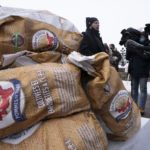Canada to resume exports of P.E.I. potatoes to U.S. after potato wart halted trade

WASHINGTON — The United States began easing its lockdown on Prince Edward Island potatoes Thursday, reaching an "understanding" with Ottawa four months after concerns about a soil-borne fungus first blocked one of the province's most famous exports from its single most crucial market.
Canada stopped sending P.E.I. potatoes to the U.S. in November, a decision designed to pre-empt an all-out ban after potato wart fungus — an otherwise harmless disease that disfigures potatoes and reduces crop yields — was detected in several fields on the Island last fall.
That decision, coupled with the time it took the U.S. Department of Agriculture to finally issue the all-clear, has cost growers upwards of $50 million in lost revenue and convinced some that neither Ottawa nor Washington was particularly interested in resolving the dispute.
Agriculture Secretary Tom Vilsack said Thursday that "sound science" underpins all the USDA's agricultural trade decisions.
"We are confident that table-stock potatoes can enter the United States with appropriate safeguards in place to ensure the U.S. potato industry remains protected," he said in a statement.
Those safeguards, to be detailed in a forthcoming federal order, will include "additional required mitigations" to protect potato growers south of the border. Details of that order are to be published within the next 10 business days, a USDA official said.
To otherwise qualify for export, potatoes and the seed potatoes used to grow them must be from fields not known to be infested with potato wart, be washed clean of soil while still in P.E.I. and be treated with a sprout inhibitor. They also need to be graded to the U.S. No. 1 standard.
Seed potatoes, which comprise roughly 10 per cent of the Island's annual output, remain banned. Growing seed potatoes is a specialized process that's both vital to P.E.I.'s industry as a whole, and all but impossible without the revenue that comes from selling seed to U.S. markets, said Greg Donald, general manager of the P.E.I. Potato Board.
Growers have from the outset been worried that they were being side-swiped by more powerful forces in Canada-U.S. relations, including various tensions over U.S. dairy imports, Canadian softwood lumber and ongoing fears of a Buy American approach to electric vehicles.
"It was hard not to feel that way," Donald said in an interview.
But despite the pressure she was under from the industry to take a harder line, Agriculture Minister Marie-Claude Bibeau said Thursday's decision vindicated Canada's more cautious approach — both in terms of halting exports to avoid an all-out ban and opting to wait out Vilsack.
"I have always been confident that this was the right path forward," Bibeau said in an interview.
She said that includes the decision early on to ask Vilsack to assess table-stock potatoes and seed potatoes separately. Had the two not been handled on separate tracks, a decision on resuming exports could have been months or years away, Bibeau said. Equally long delays would have likely resulted had Ottawa waited for the USDA to formally ban potatoes from P.E.I., she added.
The D.C.-based National Potato Council said it was "dismayed" to see Thursday's news, ostensibly because of the risk of the fungus spreading to fields in the U.S. — a risk Canadian growers have insisted for months is non-existent.
"Given the history of disease detections, U.S. potato growers fear that potato wart in Prince Edward Island is far from under control," the council said in a statement, citing the discovery of the fungus in fields on the Island in eight of the past 10 years.
The USDA is allowing trade to resume "with essentially no additional safeguards," the council said.
"Should potato wart be transmitted to the United States, the economic consequences would be devastating and immediate," including lost access to markets around the world and more than US$225 million in foregone sales, it warned.
The council also accused the Canadian Food Inspection Agency of holding U.S. growers to a higher standard for soil testing in order to export their wares to Canada than the USDA does for Canadian producers looking to sell their potatoes stateside.
With planting season in the U.S. now underway and still a month off in Canada, P.E.I. growers suspect the U.S. wanted to delay the decision for as long as possible to give its domestic producers a head start on securing lucrative contracts with major customers.
Uncertainty over whether the U.S. market would even be an option this year has already made it difficult for producers in Prince Edward Island to plan their growing season.
This report by The Canadian Press was first published March 24, 2022.
James McCarten, The Canadian Press




